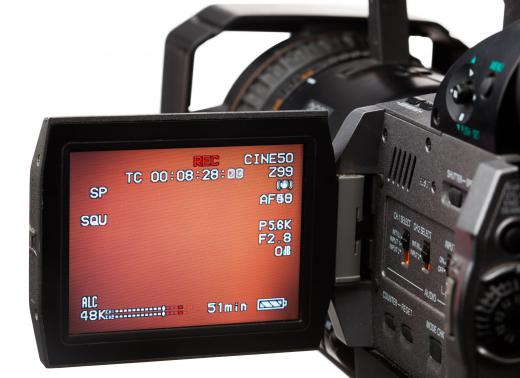At EasyTechJunkie, we're committed to delivering accurate, trustworthy information. Our expert-authored content is rigorously fact-checked and sourced from credible authorities. Discover how we uphold the highest standards in providing you with reliable knowledge.
What is a Hi8 to VHS Adapter?
Hi8 is a type of video tape that was typically used in camcorders. It was the successor to the Video8 format and was later replaced by Digital8. In much the same way that Betamax and video home system (VHS) were competing formats, Video8 and its successors were an alternative format to VHS-compact (VHS-c). Due to these difference, a direct Hi8 to VHS adapter is impossible. Any such adapter would need to translate data in real time, and would run into further problems due to the digital audio made possible with Hi8.
Some of the first home video camcorders used either Betamax or VHS. In order to create smaller camcorders, VHS tapes were miniaturized to create VHS-c. These tapes were substantially smaller, but used identical magnetic recording material. Due to those similarities, it was possible to place a VHS-c tape into an adapter that could then be played in a standard video cassette recorder (VCR). The similarity in size and shape between 8mm cassettes and VHS-c tapes does not mean that a Hi8 to VHS adapter can be, or has been, created.

The physical design of the Betamax format made a VHS-c style miniaturization problematic, which ultimately led to the 8mm family of video tapes. Where Betamax used a 12mm (0.47in) wide tape media, and both VHS and VHS-c used 12.7mm (0.50in), Hi8 used 8mm (0.31in). Not only was direct adaptation from Hi8 to VHS impossible, the difference in tape size rendered 8mm tapes unplayable even in the Betamax decks that used similar technology.

While no Hi8 to VHS adapter exists, it can still be possible to transfer video from 8mm cassettes to other formats. The simplest way to overcome the lack of a Hi8 to VHS adapter is to make use of the audio-out and video-out jacks found on most 8mm video cameras. By connecting the video-out on an 8mm camcorder to the video-in ports on a VCR, it is typically possible to save a copy of Hi8 recordings for later play on VHS cassettes.
In the absence of a working Hi8 camcorder, there may be other options. Digital8 players may be available, which are typically backward compatible with Hi8 and Video8. With a Digital8 video deck, it may be possible to use the video-out connection to record Hi8 videos to VHS or other formats like digital versatile disc (DVD). It may also be possible to use a computer to capture and encode Hi8 video for digital storage.
AS FEATURED ON:
AS FEATURED ON:












Discussion Comments
@MrMoody Yeah, there are all sorts of workarounds for going from one format to another if you don’t have a dedicated adapter.
For example, I have a digital camcorder with audio and video input jacks. I have been able to successfully convert VHS tapes to digital media by using these jacks. This is a rather expensive approach for dubbing tapes, as my digital camcorder is a bit pricey.
But once it’s in a digital media format I can download it to my computer and edit it as needed.
@hamj32 - I think transferring from one video format to another is not that hard nowadays. Not only do software packages exist which facilitate the process, but there are also devices that can perform the conversions as well.
For example, if you have old VHS tapes that you want to convert to DVD you have two options. First, you can transfer VHS to your computer using the RCA jacks as you mentioned, then convert to DVD from there.
Or you can skip that step altogether and go straight to DVD. To do that, you would use a VHS to DVD converter. This is a device you can buy that will basically read your VHS video and transfer it to DVD in one fell swoop, with no in-between hassling.
It’s great if you don’t want to mess with video editing, and lets you do a whole batch of video transfers at once.
@hamj32 - I’d go the VHS to DVD route if I were you. Basically, you still need the intermediate format, however, since you’re starting out with Hi8.
Understand that if you transfer to VHS before going to DVD, you will lose some image quality in the transfer process, and the whole idea of DVD is that it’s supposed to offer superior resolution and clarity.
I recommend that you look at options for transferring your Hi8 video directly to your computer, and transfer to DVD that way. If you have analog video outputs from your Hi8 camcorder then you just need to get a video capture card that offers TV out capabilities (i.e, those two jacks).
Most video transfer is done via Firewire but you don’t have a Firewire connection to your Hi8 camcorder, so your best bet would be to use an analog capture card and go straight to computer, then to DVD.
If I follow this correctly then, the answer to the question “What is a Hi8 to VHS Adapter?” is that it doesn’t exist, but you can use your VHS player as a dubbing tool through the audio and video input and output jacks.
That’s fair enough, but the fact is by going that route you can convert between any video format possible using those two jacks. It would be nice if a dedicated 8MM VHS tape adapter of some sort existed to make the process simpler. I have some old home movies shot in High8 and I would like to transfer them to VHS or even DVD format.
Post your comments